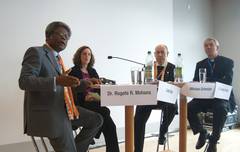Concern for the poor in a rich society

From left to right: Rogate Mshana, moderator Rev. Lioba Diez (young ecumenists' network MEET), Praeses Nikolaus Schneider and Archbishop Ludwig Schick. Photo: Juan Michel/WCC
How Christians living in a rich society deal with the concern for the poor was one of the subjects discussed by participants at a German church convention (Kirchentag) celebrated in Munich, from 12-16 May.
Churches in Germany and Europe are “integrated into the society, and thus are also part of the international market system”, said Praeses Dr Nikolaus Schneider, chairperson of the Council of the Evangelical Church in Germany (EKD).
This is because “church members, whether they like it or not, work in companies that are integrated into this system”, Schneider explained. “The church tax which they pay is also due to the fact that this system is functioning. We are profiteers of this system”, he added.
In that context, Schneider argued, “the real issue” that needs to be discussed is whether there is a way “to get out of the capitalist economic system and establish an alternative”, or whether that system can be shaped “in such a way that it becomes fair and allows for the interests of the poor”.
Such a question is “very difficult to answer”, acknowledged Schneider, who is the head of the Evangelical Church in the Rhineland and was speaking at a panel discussion on the theme: “Cry from the South – have our churches responded enough?”
The panel was part of the programme of the Kirchentag. This church convention, celebrated ecumenically for the second time, was organized by Protestant and Catholic lay movements and attracted about 125,000 participants.
Schneider's intervention followed opening remarks made by Dr Rogate Mshana, a Tanzanian economist who is director of Justice, Diakonia and Responsibility for Creation at the World Council of Churches.
Mshana emphasized the need to address the root causes of poverty and of the growing gap between the rich and the poor both between and within nations. “This view is a distinctive contribution that churches in the South can make”, he said.
With regard to causes, Mshana put the blame on the dominant paradigm of economic globalization. Within its logic, “a few countries gathered in the G20 speak for the world and in time of crisis divert enormous resources to rescue failed banks instead of small farmers”, he said.
Mshana shared the story of his brother, a farmer who grows sugar cane in Tanzania and saw its price go down because of the over-abundance of European sugar in the market. “My brother said to me”, Mshana told the audience, “I don't want aid, I want justice”.
“From a human and social perspective, the injustice we see is the biggest scandal in the world today”, said the Catholic Archbishop of Bamberg, Dr Ludwig Schick, who was also a panellist. Just like Schneider, Schick acknowledged that churches in the North share in the profits of a system that is unfair and needs to be reformed.
Schick suggested that churches in rich countries have a triple duty: hear and interpret the cry of the poor, respond to it with aid for development and be their advocates. “Time and again, we need to step on the toes of the powerful, who can and must help, and say: Here, injustice is happening and something needs to be done about it”, he said.
Schneider proposed to engage in a critique of the market economy at the grassroot level, also in rich societies. This is possible today because the shortcomings of the market are increasingly affecting people's lives.
“The North is moving towards the South”, Schneider said. “Impoverishment is taking place” in Germany, where a widening gap between the rich and the poor can be observed. Today, “there is nobody in Germany who does not know family members who are touched by unemployment or facing other big problems”.
On a different, more practical level, both Schneider and Schick suggested that church members and congregations should commit more deeply to fair trade practices and change their personal consumption habits and lifestyles.
Both leaders warned that churches need to be modest: “We cannot do everything”, said Schick. “Let's be realistic in order to avoid frustrations”, added Schneider.
The economic and social injustice is often seen as a problem of the South, but it is actually “the problem of all of us”, said Mshana. He called for a radical re-thinking of the market economy and of the global financial system.
“Reform is not enough”, he said, “what we need is transformation.”
More information on the WCC programme Justice, Diakonia and Responsibility for Creation
More information on WCC activities at the Second Ecumenical Kirchentag
WCC member churches in Germany



